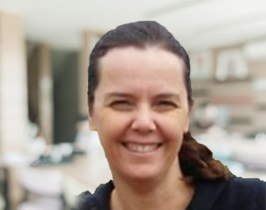 Título da palestra: Probing the catalytic sites for hydrogen production from biomass-derived oxygenates
Título da palestra: Probing the catalytic sites for hydrogen production from biomass-derived oxygenates
Resumo da palestra: A significant share of the wordeconomy depends on process that uses catalysts and demands the development of more efficient and environmental friendly alternatives. Hydrogen is an important energy carrier and competitive and cleaner ways for its production are being sought. Catalytic reforming reactions of biomass derivatives are a natural alternative to be pursued, targeting to substitute the use of fossil fuels, such as methane, by renewable sources, such as glycerol and ethanol. Despite significant advances in understading how the catalysts work in the set of reactions involved in the hydrogen production, much has to be overcome yet to achieve rational designing from first principles. In this long pathway, the striking development of the synthesis of nanomaterials coupled to advances in in situ characterization tools at atomic level have allowed addressing important aspects in catalyst development. In this talk, model Pt-supported catalysts and modulation excitation spectroscopy are used as examples to discuss the role of different catalytic sites in the hydrogen production.
Resumo do palestrante: Prof. Daniela Zanchet is an Associate Professor of the Inorganic Chemistry Department - University of Campinas, Brazil. She obtained her bachelor’s degree in Chemical Engineering from the Federal University of Paraná and master and PhD degrees in Physics from the University of Campinas. She worked as a post-doctorate fellow at the University of California, Berkeley and as a visiting researcher at the Massachusetts Institute of Technology (MIT). She also worked as a researcher at the Brazilian Synchrotron Light Technology-LNLS for more than ten years where she coordinated the initiative to developing dedicated instrumentation for in situ studies of catalysts at LNLS, supported by Petrobras. Her group focuses on the development and study of heterogeneous catalysts, based on the exploration of model nanometric systems and advanced characterization tools. She has experience in the field of nanomaterials and heterogeneous catalysts, targeting hydrogen production, CO2 and CH4 conversion and up-grading of biomass-derivatives.
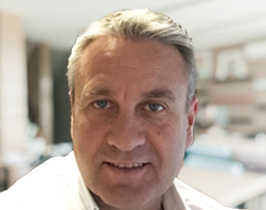 Título da palestra: Progress in biomass catalytic pyrolysis for the production of advanced biofuels and bio-based chemicals
Título da palestra: Progress in biomass catalytic pyrolysis for the production of advanced biofuels and bio-based chemicals
Resumo do palestrante: David Serrano is Director of the IMDEA Energy Institute and Full Professor of Chemical Engineering at Rey Juan Carlos University. He is also Head of the Thermochemical Processes Unit at IMDEA Energy. Ph.D. received from Complutense University of Madrid (1990) awarded with the Extraordinary Mention. He has been Visiting Associated in the California Institute of Technology (CALTECH, 1991) and in the California University of Santa Barbara (2006). He was appointed as Associate Professor at Complutense University of Madrid (1990-1999), and subsequently at Rey Juan Carlos University. In the latter, he was appointed as Full Professor (2002) and was in charge of different management and academic positions: Coordinator of the Environmental Sciences Area (1999-2001), Vice-rector for Research and Technological Innovation (2001-2002) and Head of the Chemical and Environmental Technology Department (2002-2007). His teaching activity has been focused on subjects related to Chemical Engineering, Environmental Engineering and Energy Engineering in a number of degrees, masters and Ph.D. courses. He has participated in about 73 research projects funded by both public and private institutions, with a significant number of collaborations established with the industrial sector. He has been author of about 230 publications in scientific journals (h =62 and > 11500 citations, according to google scholar). Likewise, he has been author of more than 330 communications to congresses and scientific meetings, of 5 patents and of 4 books. He has been supervisor of 24 Ph.D. theses. He has been member of the Executive Board of the ACENET network (ERA-NET for Applied Catalysis Research in Europe) and of the “Círculo de Innovación en Tecnologías Medioambientales y Energía” (CITME). He is member of the Scientific Committee of CIESOL (Almería, Spain) and of the German Biomass Research Centre (Leipzig, Germany), president of the Spanish Group of Zeolites (GEZ) and member of the Board of Governors of the Spanish Catalysis Society (SECAT) and of the European Federation of Zeolite Associations (FEZA).
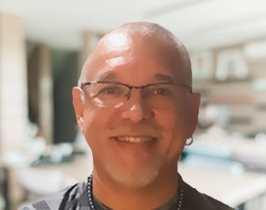 O professor Alexandre Leiras Gomes apresentará uma aula sobre Refino, no último dia da Escola de Catálise.
O professor Alexandre Leiras Gomes apresentará uma aula sobre Refino, no último dia da Escola de Catálise.
Resumo do ministrante: Possui graduação em Engenharia Química pela Universidade Federal do Rio de Janeiro (1990), mestrado em Engenharia Química pela Universidade Federal de São Carlos (1992) e doutorado em Engenharia Química pela Universidade Federal do Rio de Janeiro (2003). Em 2007 fez estágio de pós-doutoramento no Instituto Superior Técnico de Lisboa, Portugal, em Processos Industriais de Engenharia Química. É professor da Universidade Federal do Rio de Janeiro desde 1995, onde exerceu os cargos de Coordenador dos Cursos de Graduação em Engenharia Química (11/1996-01/1998) e Engenharia de Petróleo (03/2006-12/2011), Chefe do Departamento de Processos Orgânicos da Escola de Química (03/2014-02/2018) e Coordenador do PRH-13 - Programa EQ-ANP (01/2018-12/2018). Atualmente é Professor Titular do Departamento de Processos Orgânicos e Diretor Adjunto de Infraestrutura e Tecnologia da Informação da EQ/UFRJ. Tem experiência na área de Engenharia Química, com ênfase em Petróleo e Petroquímica, atuando principalmente nos seguintes temas: Refino de Petróleo, Caracterização de Combustíveis e Catálise Heterogênea.
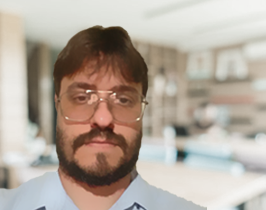 O professor André Luís Alberton apresentará uma aula sobre Tratamento de Dados, no último dia da Escola de Catálise.
O professor André Luís Alberton apresentará uma aula sobre Tratamento de Dados, no último dia da Escola de Catálise.
Resumo do ministrante: Graduou-se em Engenharia Química pela Universidade Estadual de Maringá (2004). Possui Mestrado, Doutorado e Pós-Doutorado pelo Programa de Engenharia Química da Universidade Federal do Rio de Janeiro (PEQ/COPPE/UFRJ). Atuou como professor 40h na PUC-Rio entre 2010-2013. Atualmente, é professor adjunto na Universidade do Estado do Rio de Janeiro (UERJ). Suas linhas de pesquisa incluem: cinética e catálise, modelagem e simulação e otimização de processos, estimação de parâmetros e planejamento de experimentos.
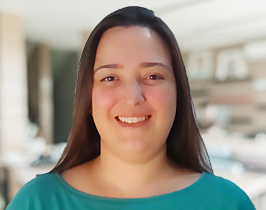 A professora Clarissa Perdomo apresentará uma aula sobre Reação Modelo: Decomposição do Isoporpanol, no quarto dia da Escola de Catálise.
A professora Clarissa Perdomo apresentará uma aula sobre Reação Modelo: Decomposição do Isoporpanol, no quarto dia da Escola de Catálise.
Resumo da ministrante: Possui graduação em Engenharia Química pela Pontifícia Universidade Católica do Rio Grande do Sul (2002), mestrado em Engenharia Química pela Universidade Federal do Rio Grande do Sul (2004) e doutorado em Engenharia Química pelo Instituto Alberto Luiz Coimbra de Pós-Graduação e Pesquisa de Engenharia (2009). Atualmente é pesquisador do Instituto Nacional de Tecnologia no Rio de Janeiro. Tem experiência na área de Engenharia Química, com ênfase em Reatores Químicos, atuando principalmente nos seguintes temas: reatores químicos, utilização do etanol como matéria-prima em processos químicos e avaliação de catalisadores.
